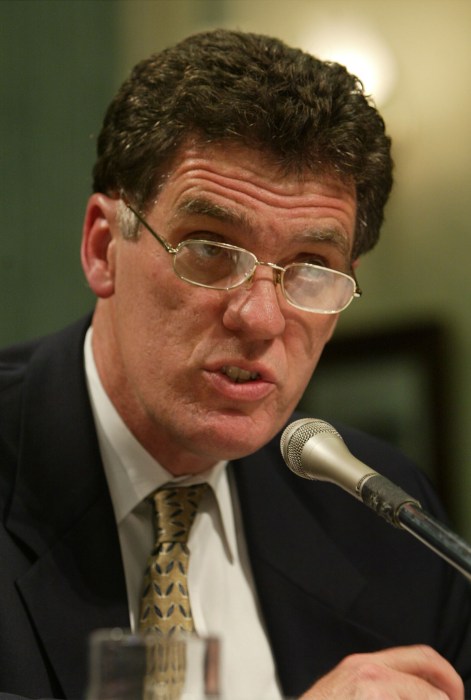Schools: Fewer Teachers, More School Taxes If Mangano Plan Passes
County Executive Edward P. Mangano campaigned for and won his current position with a clear promise to lower spending and taxes for Nassau. The day draws near when he must deliver, arriving at a balanced budget for 2011 without raising taxes or increasing the deficit. This has led to painful proposals, drawing protests on extreme moves like cutting loose the entire Long Island Bus system and turning the high expense of tax refunds over to schools, towns, villages and other special districts including libraries and fire districts.
At a hearing before the Nassau County Legislature on Monday, Oct. 18, with this tax refund switch on the table, the ultimate question raised and discussed was: should the county government make a move to protect its own financial state, if that move would cause higher taxes and expenses in the long run for taxpayers? School supporters came out in droves to share their take on this question, telling lawmakers that ending the “guarantee” that the county now has in place to refund its own mistaken tax collecting will cause a loss of teachers and an increase in taxes for residents within Nassau’s 56 school districts – potentially causing budgets – budgets people can actually vote on – to fail at a time of financial challenges and tax caps looming. They argued that if one thing still attracts people to the area, it is good schools. Inflicting one more major blow on quality of local education could end this, they warned.
“This is a cynical attempt to pass your costs to the schools,” accused Dr. Igor Webb, president of the North Shore Board of Education. “We will have to raise taxes and lower services… It is not the case that there is a problem being solved here. What you are doing threatens the golden goose that is the school systems of Nassau County,”
Since 1938, Nassau County has had permission from New York State to assess property values on behalf of all the taxing entities within its borders and collect taxes accordingly. Only one other county does this, upstate’s Tompkins County.
Pat Foye, one of Mangano’s deputy county executives, presented to lawmakers Monday that this process is resulting in huge losses for Nassau, as bad assessments have led to $250 million in refund costs each year, creating $1.5 billion in debt related to covering that cost. Therefore, to keep the county from going bankrupt, he explained that it was necessary to abandon this cost at the county level.
What made for debate, and fueled the arguments of this plan’s detractors at the hearing, is that the county will still perform the bad assessments, simply turning over the responsibility to pay the refunds on its bad assessments to other governments and schools. Foye explained that this plan would not go into effect until 2013, however, and the hope was that by that time the assessment process should work properly, and measurements taken this year to prevent grievances would take effect, so refunds would not create such a high cost. The obvious skeptical response, repeated throughout the room by several dissenting legislators and school representatives, was: if the assessment process would be fixed and stop costing money – something multiple administrations have failed to achieve, why turn over the refund responsibility to others?
“You’re assuming the system will be fixed,” Legislator Kevan Abrahams told Foye. “I don’t make that assumption. This has been going on a long time… If this won’t go into effect until 2013, why vote now? I think you don’t think you’ll fix the problem… This doesn’t save the taxpayer any money.”
Legislator Judi Bosworth echoed, “I don’t believe you solve a problem by making it someone else’s. This is an abdication of responsibility.”
The other major objection from some legislators revolved around the fact that while the county administration is saying this move will simply mean taxpayers writing the same check to a different government, the reality is that the cost will be higher at the end of the day. Some legislators argued that the county will not be lowering taxes as a result of removing this cost from the budget, so there is not a level swap – there will be a tax increase in total as residents pay the same county taxes combined with higher local and school taxes to cover the refunds that the county passed on.
“This is not a zero-sum game here,” Legislator Wayne Wink said in this regard. “Will the county return the $80 million it is saving [by not paying refunds] to the taxpayers? The fact of the matter is that the $80 million will be used for other purposes.”
Legislator Robert Troiano added, “It is disingenuous to say taxes won’t go up for the ordinary taxpayer. What’s being proposed by the county executive harms everyone.”
Opponents further argued that the county has more options for dealing with costs, like bonding them, which spreads one cost over many years, and for amassing non-tax revenues, like fees – options schools do not have. And, it already has the infrastructure for the assessment process in place, whereas other bodies would have to take on the expense of administering a whole new enterprise.
“This is one more unfunded mandate – the hardest part of the job for school boards,” Legislator Joseph Scannell said. “They will be forced to hire their own assessment people… they are not going to rely on this broken system… schools and villages will lose services because of this.”
Minority Leader Diane Yatauro and others in her caucus asked why a report due in June from the loudly heralded Assessment Review Team, headed by Foye, to solve the issues causing bad assessments, was never delivered. She accused the county administration of shirking its goal of fixing the system and simply taking care of its own books while adding to the burden on taxpayers.
“How is it that you are comfortable saying to the taxpayer that you’re doing whatever you need to do to make yourselves whole? You’re putting the job you were supposed to do, fixing the assessment system, on the back burner and taxing all of us through the schools, just so the county executive can say ‘We didn’t raise taxes.’”
The Legislature left the hearing open. It must vote on a budget this month.






























